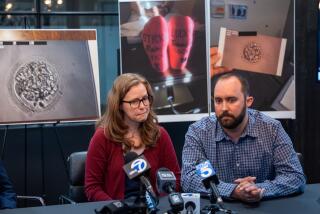Patents for human stem cells invalidated
The U.S. Patent and Trademark Office has invalidated three broad patents for human embryonic stem cells that have been blamed for slowing research in the highly visible field of regenerative medicine.
The office ruled the discovery of embryonic stem cells from primates -- including humans -- was not worthy of patent protection because scientists had used similar methods to isolate embryonic stem cells from mice and other mammals, and described the cells’ potential for producing medical therapies.
“They rejected every one of the claims,” said John Simpson, stem cell project director at the Foundation for Taxpayer and Consumer Rights in Santa Monica, one of the public interest groups that brought the challenge last year.
The patent office issued its decisions Friday and released them to the public Monday.
The patents have been a serious problem for stem cell scientists, who have been worried about the costs and restrictions imposed by the patent holder, the Wisconsin Alumni Research Foundation, or WARF. Some U.S. companies moved their research operations overseas, where the patents are not in force, after failing to strike a licensing deal with the Madison-based foundation, which manages the university’s intellectual property.
The nonprofit foundation’s attorneys have two months to respond to the concerns; if they don’t succeed they can take the case to the Board of Patent Appeals and Interferences. If the patents are not reinstated, the foundation can file a claim in court.
“WARF has absolute confidence in the appropriateness and legitimacy of these patents,” said the group’s managing director, Carl Gulbrandsen. Meanwhile, “all of WARF’s patents remain in place and are legally viable,” the group said Monday.
The first of the three controversial patents was issued in 2001, three years after University of Wisconsin researcher James Thomson became the first to isolate stem cells from human embryos donated by fertility clinics.
“It is inconceivable to us that Dr. Thomson’s discovery ... would be found to be not worthy of a patent,” Gulbrandsen said.
As stem cell research heated up, the foundation gained a reputation for driving a hard bargain with universities and companies that wanted to use human embryonic stem cells.
After numerous complaints, the foundation softened its requirements last year and reduced fees and legal requirements for academic researchers. Researchers still bristled at the idea that the cells, a natural product of human development, could be patented.
The federal patent examiners cited patents and research papers going back to 1983 showing that stem cells harvested from mammalian embryos could be kept alive indefinitely while maintaining the ability to become heart muscle, nerve fiber or any other kind of cell. They noted that a 1992 patent involving mice stem cells described the potential for using the same techniques to create human embryonic stem cells.
Thomson’s discovery was “obvious in the absence of clear and convincing evidence to the contrary,” the filing said.
Industry experts said it wasn’t unusual for a patent to be invalidated and then reinstated, at least in part, on appeal.
*






